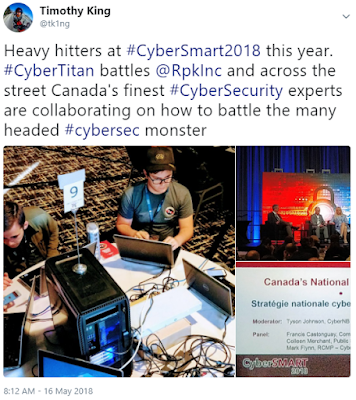What got me thinking about cyber-security was an article WIRED did last year on the Russian attack on the Ukraine. Countries are now attacking each other using information technology infrastructure, yet we seem happily oblivious to this in Ontario. New Brunswick entered 10x more schools into this competition than Ontario did - New Brunswick has seven hundred and fifty thousand people in it. NB is also launching a number of provincial initiatives to place them at the front of a rapidly expanding and very under-served industry:
Homepage - CyberNB
Welcome - NBIF - FINB
 |
| 1st time on a plane, 1st time out of the province for half our team - they'll never forget this trip. |
I'm going to be presenting on our participation in the Canadian CyberTitan arm of the US based Cyberpatriot competition at the OTF PB4Technology conference in August, and again at ECOO in November. If you're curious about how to get into CyberTitan, it runs as separate contests for middle schools and high schools. You do three 6 hour rounds during the school year, and depending on where you finish, you might find yourself on a fully funded trip to New Brunswick for the national finals in 2019. What you're doing in the competition is searching for malware and exploits and removing them from the systems. It's ICT technical work crossed with investigation.
 You don't need to be techie or have previous experience to get into the competition. It's a small entry price ($200 last year) and you get 10x back in access to Cisco, Microsoft and other content. You also get a really nice set of team shirts, pins and challenge coins (Americans know how to do swag). Your students also get to brag about working off US government servers, because that's where the contest takes place virtually.
You don't need to be techie or have previous experience to get into the competition. It's a small entry price ($200 last year) and you get 10x back in access to Cisco, Microsoft and other content. You also get a really nice set of team shirts, pins and challenge coins (Americans know how to do swag). Your students also get to brag about working off US government servers, because that's where the contest takes place virtually.Cyber-sec is a field that is in high demand, it's exciting, ever changing and the requirements and pathways to get to it are rapidly evolving and improving. The Canadian Forces are launching a cyber-command that will offer high school graduates equivalent college level training in cyber-ops.
From military to government to industry, this is a rapidly expanding and diversifying field of study that isn't just about comp-sci degrees any more. Considering the fragility of our ICT infrastructure and the number of state and individual threats to it, I'm astonished that we haven't worked towards integrating cyber-security into our curriculum sooner. The US Department of Homeland Security has a great resource on cyber-sec education called NICE: National Initiative for Cybersecurity Education (NICE) | NIST
 |
| Hours in and hours to go - engagement was 100% through the whole thing even with technical failures and other frustrations. |
Some links:
Links to next year's CyberTitan competition:
Register – CyberTitan – ICTC Canadian Youth Cyber Education Initiative
If you're curious about who the Information and Communication Technology Council of Canada (ICTC) are, you can learn more about them here: https://www.ictc-ctic.ca/about/
From Public Safety Canada: Critical Infrastructure... Critical Infrastructure

A recent blog post on the competition and our lack of focus on vital, 21st Century infrastructure: Dusty World: Cyber Security and Critical Infrastructure Ignorance
Not covering the skills and knowledge needed to maintain our critical infrastructure in Ontario Classrooms is a glaring oversight (IMO)...


























